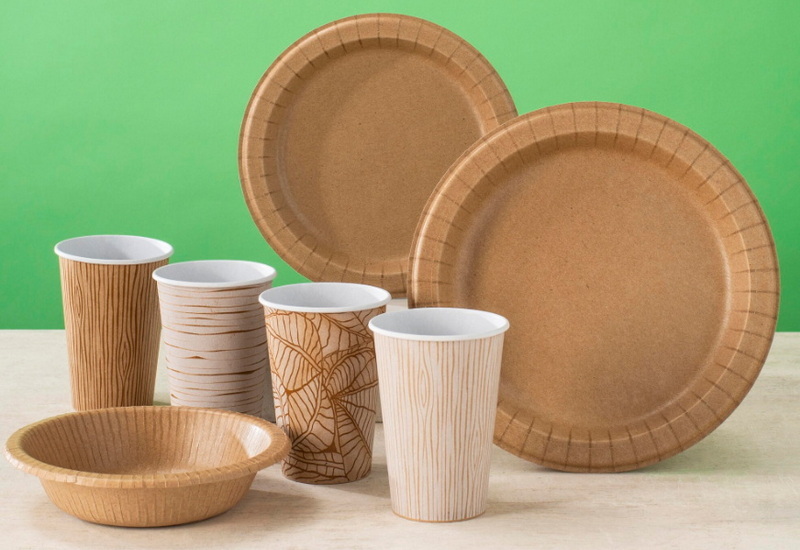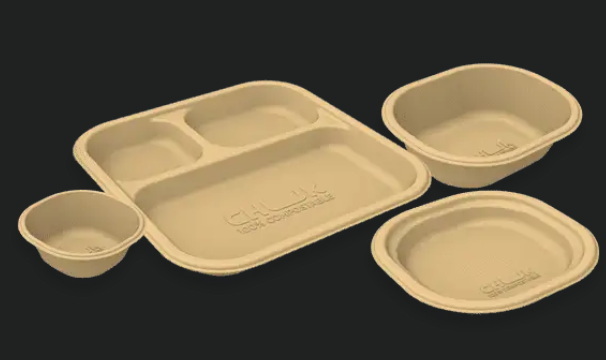
Content Menu
● Introduction to Eco-Friendly Materials
● Top Eco-Friendly Disposable Plates and Bowl Brands
>> 1. GuRui
>> 2. bambu
>> 3. Ancheng
>> 4. Jolly Chef
>> 5. Smarty Had A Party
● Benefits of Eco-Friendly Disposable Plates and Bowls
>> Reduced Waste and Pollution
>> Lower Carbon Footprint
>> Non-Toxic and Safe
● Market Trends and Future Outlook
>> Sustainability and Innovation
>> Technological Advancements
>> Global Market Expansion
● Impact on the Hospitality Industry
>> Sustainable Tableware Trends
● Consumer Preferences and Market Response
>> Ethical Sourcing and Carbon Footprint Reduction
>> Minimalist and Recyclable Packaging
● Future Trends in Sustainable Packaging
>> Transparent and Informative Labeling
● Conclusion
● FAQs
>> 1. What materials are eco-friendly disposable plates and bowls made from?
>> 2. How long do biodegradable plates take to decompose?
>> 3. Are eco-friendly disposable plates safe for hot and cold foods?
>> 4. Can biodegradable plates be used for large events?
>> 5. How do eco-friendly disposable plates reduce waste?
● Citations:
In recent years, the demand for eco-friendly disposable plates and bowls has surged, driven by growing concerns about environmental sustainability and the need to reduce plastic waste. Traditional disposable tableware, often made from plastic or Styrofoam, contributes significantly to pollution and greenhouse gas emissions. In response, numerous brands have emerged offering sustainable alternatives made from renewable materials such as bamboo, sugarcane bagasse, and palm leaves. This article explores the top eco-friendly disposable plates and bowl brands, their innovative materials, and the benefits they offer for both consumers and the environment.

Introduction to Eco-Friendly Materials
Eco-friendly disposable plates and bowls are crafted from materials that are biodegradable, compostable, and non-toxic. These materials include:
- Bamboo: Known for its rapid growth and minimal environmental impact, bamboo is a highly renewable resource. Brands like bambu and Ancheng use bamboo to create durable and compostable tableware. Bamboo is also versatile, offering a natural texture that adds a rustic yet elegant touch to any setting.
- Sugarcane Bagasse: A byproduct of sugarcane processing, bagasse is used to make sturdy, microwave-safe plates that are fully compostable. This material is particularly popular among major food chains and event caterers due to its durability and eco-friendly credentials.
- Palm Leaves: Naturally fallen palm leaves are collected, cleaned, and heat-pressed into plates and bowls that are biodegradable and compostable. These products are ideal for large events and are microwave-safe for up to 2 minutes and oven-safe up to 350°F for 45 minutes.
Top Eco-Friendly Disposable Plates and Bowl Brands
1. GuRui
GuRui is renowned for its palm leaf plates and bowls, which are 100% biodegradable and compostable. These products are ideal for large events and offer a sustainable alternative to traditional disposable tableware. GuRui's commitment to sustainability aligns with consumer preferences for environmentally responsible products.
2. bambu
bambu offers a range of compostable bamboo plates and dinnerware. Their Veneerware line is made from FSC-certified bamboo, ensuring a sustainable and stylish dining experience. bambu's products are designed to be durable and aesthetically pleasing, making them suitable for both casual and formal settings.
3. Ancheng
Ancheng is a leading manufacturer of biodegradable wood and bamboo plates. They provide customization options and focus on sustainable practices to reduce environmental impact. Ancheng's commitment to eco-friendly materials and responsible manufacturing processes makes them a preferred choice for environmentally conscious consumers.
4. Jolly Chef
Jolly Chef specializes in sustainable tableware made from bagasse and wood-based materials. Their products are designed to be durable, biodegradable, and compostable. Jolly Chef's focus on innovative materials and design-forward tableware has positioned them as leaders in the eco-friendly disposable tableware market.
5. Smarty Had A Party
This brand offers a curated collection of eco-friendly disposable plates made from renewable materials. Their products are stylish, durable, and perfect for events. Smarty Had A Party's emphasis on sustainability and aesthetics makes their products a popular choice for consumers seeking eco-friendly solutions without compromising on style.

Benefits of Eco-Friendly Disposable Plates and Bowls
Reduced Waste and Pollution
Eco-friendly disposable plates and bowls significantly reduce waste by decomposing naturally into organic matter. This helps minimize landfill waste and decreases pollution. The shift towards biodegradable materials also supports government initiatives to reduce plastic waste and promote sustainable practices.
Lower Carbon Footprint
The production of eco-friendly tableware generally requires less energy and emits fewer greenhouse gases compared to traditional materials. This reduction in carbon footprint aligns with global efforts to combat climate change and promote sustainable living.
Non-Toxic and Safe
These products are free from harmful chemicals, ensuring they are safe for all ages and do not leach toxins into food. The non-toxic nature of eco-friendly disposable plates and bowls provides peace of mind for consumers, especially in settings where food safety is paramount.
Market Trends and Future Outlook
The global disposable plates market is poised for significant growth, driven by increasing consumer demand for convenience, rising awareness of hygiene, and the expanding food service sector. The shift towards on-the-go consumption and online food delivery services has fueled the demand for disposable plates. Additionally, the trend of household gatherings, picnics, and corporate events further solidifies their necessity.
Sustainability and Innovation
Innovations in biodegradable materials and smarter manufacturing processes are leading the industry forward. Brands are focusing on design-forward tableware that is both functional and aesthetically pleasing. The integration of customization and branding on disposable plates for restaurants, cafes, and corporate events is also a growing trend, enhancing brand visibility and appeal.
Technological Advancements
Technological advancements are playing a pivotal role in shaping the future of disposable plates. Improved manufacturing techniques, enhanced durability, and water- and grease-resistant coatings are being incorporated to make eco-friendly options more functional. These advancements ensure that eco-friendly disposable plates can meet the demands of both casual dining and catering services.
Global Market Expansion
Developing economies, particularly in Asia-Pacific and Latin America, are witnessing heightened adoption of eco-friendly disposable plates due to urbanization, increasing disposable income, and evolving lifestyles. The demand for sustainable packaging aligns with consumer preferences, pushing companies to innovate and launch premium, high-quality eco-friendly disposable plates.
Impact on the Hospitality Industry
In the hospitality sector, bars and restaurants are increasingly choosing tableware crafted from eco-aware materials such as bamboo, recycled glass, biodegradable materials, and stainless steel. According to a report by the Green Hospitality Alliance, 72% of consumers are more likely to support establishments that prioritize sustainability in their operations. The drive towards zero waste has led to a growing demand for reusable and durable tableware, with multi-use plates, cups, and cutlery becoming the norm.
Sustainable Tableware Trends
Sustainable tableware continues to rise as a trend in 2025, with a focus on aesthetic innovation and cultural fusion. The use of biodegradable materials, recycled glass, and stainless steel is becoming more prevalent, reflecting consumers' increasing preference for environmentally responsible products. This shift aligns with the broader movement towards sustainable living and reducing waste in the hospitality industry.
Consumer Preferences and Market Response
Consumers today demand more than just practicality—they want environmentally responsible products that align with their values while maintaining durability and aesthetic appeal. In response, manufacturers are focusing on design-forward tableware that blends functionality with style. Elegant color palettes, floral patterns, and minimalist aesthetics are becoming popular trends in disposable tableware, making them suitable for upscale events and formal gatherings.
Ethical Sourcing and Carbon Footprint Reduction
Sustainability isn't just about materials—it's about how products are sourced and produced. Brands like Jolly Chef are dedicated to ethical sourcing and sustainable harvesting practices. They continuously explore ways to reduce emissions in their supply chain, from energy-efficient manufacturing to optimized shipping methods that cut down on fuel consumption.
Minimalist and Recyclable Packaging
The adoption of minimalist and recyclable packaging is another key trend. Brands are minimizing waste by using eco-conscious packaging that ensures product integrity while reducing environmental impact. This approach not only aligns with consumer preferences for sustainability but also enhances brand image by communicating an eco-friendly ethos.
Future Trends in Sustainable Packaging
In 2025, the future of sustainable packaging is set to see an increase in creative alternatives. New tableware companies are exploring innovative materials and methods to design products that aren't just eco-friendly but also functional and visually attractive. Some of these options include edible containers made of seaweed, bio-based films, and eco-friendly food packaging embedded with seeds that can be planted following usage, creating an eco-friendly circular economy.
Transparent and Informative Labeling
The public is increasingly looking for transparency and details regarding the sustainability of items they purchase. To meet this demand, brands have introduced clear labels and informative information in their packages. This includes details about the ingredients used, certifications obtained (such as carbon neutrality or compostability), and instructions on properly disposing of or recycling. With these details, brands help customers make educated choices and demonstrate their commitment to sustainable practices.
Conclusion
The shift towards eco-friendly disposable plates and bowls is a crucial step in reducing environmental degradation caused by traditional disposable tableware. Brands like Verterra, bambu, Ancheng, Jolly Chef, and Smarty Had A Party are leading this change by offering sustainable, biodegradable, and compostable products. By choosing these alternatives, consumers can significantly reduce waste, lower their carbon footprint, and support a healthier environment.

FAQs
1. What materials are eco-friendly disposable plates and bowls made from?
Eco-friendly disposable plates and bowls are typically made from renewable materials such as bamboo, sugarcane bagasse, palm leaves, and wood-based materials. These materials are biodegradable and compostable, reducing environmental impact.
2. How long do biodegradable plates take to decompose?
Biodegradable plates generally decompose within 60-90 days in a commercial composting facility, depending on the material and conditions. In home composting systems, they may take longer, typically 4-6 months for bamboo-based products.
3. Are eco-friendly disposable plates safe for hot and cold foods?
Yes, many eco-friendly disposable plates are designed to be safe for both hot and cold foods. They are often microwave-safe and can withstand freezing temperatures without compromising quality.
4. Can biodegradable plates be used for large events?
Absolutely! Biodegradable plates are ideal for large events like weddings and corporate gatherings. They are durable, stylish, and offer a sustainable alternative to traditional disposable tableware.
5. How do eco-friendly disposable plates reduce waste?
Eco-friendly disposable plates reduce waste by decomposing naturally into organic matter, minimizing landfill waste and pollution. They also promote composting initiatives, returning nutrients to the soil.
Citations:
[1] https://www.accessnewswire.com/newsroom/en/industrial-and-manufacturing/disposable-plates-market-to-expand-at-36-cagr-through-2035-driven-by-fo-983798
[2] https://jollychef.com/ja/blogs/news/the-future-of-disposable-tableware-sustainability-innovation-design-trends-for-2025
[3] https://www.allianceonline.ie/blog/2025/01/tableware-trends-in-bars-and-restaurants-for-2025/
[4] https://www.freshtableware.in/post/top-trends-in-sustainable-packaging
[5] https://reads.alibaba.com/smart-choices-in-disposable-dinnerware-amp-tableware-what-to-know/
[6] https://www.greenpower.org.hk/eng-all-about-greens/calling-for-comprehensive-regulation-of-disposable-plastic-tableware
[7] https://diyecobox.com/5-ecofriendly-trends-shaping-the-future-of-food-service-2025/
[8] https://www.yankodesign.com/2025/03/08/top-5-sustainable-product-design-trends-to-look-for-in-2025/
[9] https://www.epd.gov.hk/epd/sites/default/files/epd/english/environmentinhk/waste/pub_consult/files/tableware-con-doc-en.pdf
[10] https://www.sumkoka.com/sustainable-food-packaging-latest-trends.html
[11] https://www.shaleenratansi.com/blog/10-eco-friendly-materials-revolutionizing-sustainability-in-2025
[12] https://www.info.gov.hk/gia/general/202310/18/P2023101800622.htm
[13] https://finance.yahoo.com/news/disposable-plates-market-expand-3-010000851.html
[14] https://upcycleluxe.com/blogs/our-readers-digest/eco-friendly-products-2025-innovations-in-sustainable-living
[15] https://www.eyeonesg.com/2023/11/hong-kong-promotes-product-eco-responsibility-new-regulations-on-disposable-plastic-products/
[16] https://www.globenewswire.com/news-release/2024/10/29/2970595/28124/en/Biodegradable-Disposable-Tableware-Market-Research-2024-2030-with-Analyst-Recommendations-Expand-Product-Range-and-Customization-Options-Promote-Circular-Economy-Practices.html
[17] https://www.vancassotableware.com/blogs/news/2025-salad-plate-trends
[18] https://www.scmp.com/news/hong-kong/health-environment/article/3145243/ban-all-plastic-cutlery-2025-green-groups-urge
[19] https://hongkongfp.com/2021/08/24/hong-kong-green-groups-seek-faster-plastic-tableware-ban-before-2025/
[20] https://www.allianceonline.co.uk/blog/2025/01/tableware-trends-in-bars-and-restaurants-for-2025/

















